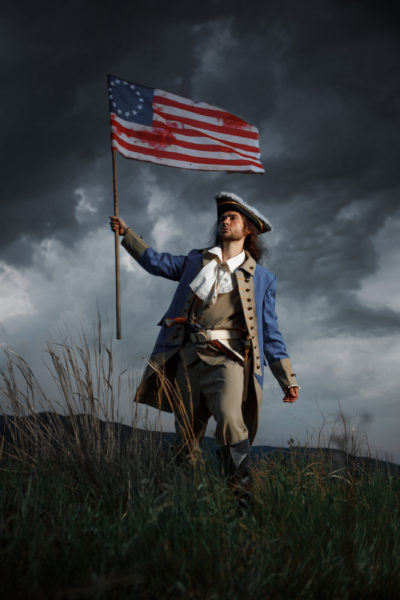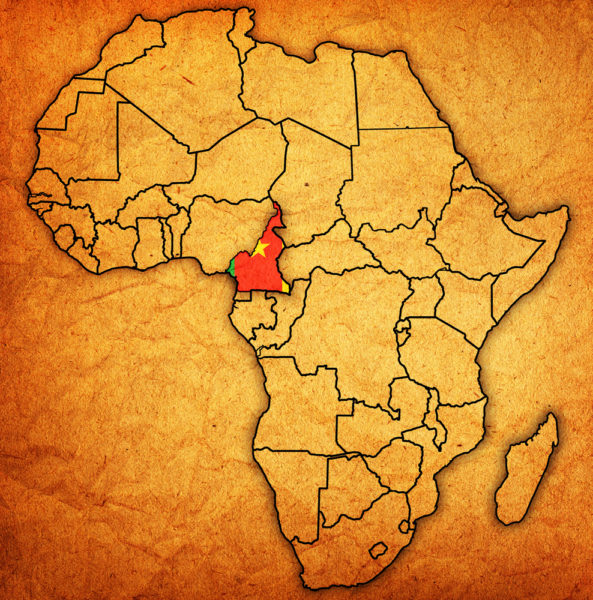Out with the Oppressors!
Yesterday began with a text from my friend Sally: “Happy July 4th, celebrating freedom from those tyrannical Brits.” In that she herself is British, and as far from tyrannical as one can get, the message was especially rich in contrasts. At first conjuring images of two sides in battle, it then sent me into more nuanced layers: in most resistance movements, everyone doesn’t resist equally.
Fighting the Power, in History
On a drizzly day that felt not much like a regular 4th, the message served as a nice reminder about the origin of this holiday. Yes, those Patriots weren’t picnicking or watching colorful explosions in the sky from their lawn chairs — they were dealing with the serious business of getting out from under the weight of suffocating oppression. At least, most of them probably were. Take the guy in this picture, for instance.

We don’t really know how much he risked to fight tyranny; his uniform looks awfully clean. Maybe he was mostly waving a flag while others were getting torn apart? Still others, meanwhile, probably even stayed home, tending their farms as usual, or even actively supported the British. They were called Loyalists…and maybe eventually outright traitors.
For the Rebels as a group, getting to armed conflict didn’t happen suddenly. Following the very lengthy section of the Declaration of Independence listing everything (or maybe far from everything) the King of Great Britain was guilty of doing — a section that, if you read it over, is breathtaking in the beauty and clarity of its construction– comes this much shorter paragraph:
In every stage of these Oppressions We have Petitioned for Redress in the most humble terms: Our repeated Petitions have been answered only by repeated injury. A Prince, whose character is thus marked by every act which may define a Tyrant, is unfit to be the ruler of a free people.
Persuasive stuff. I mean, if you honestly try to get someone to stop hurting you and he/she/they won’t — well then, what else is left but to end the relationship?
Fortunately, we, or our ancestors, pulled off this necessary division and almost 250 years later we still get to have British friends and enjoy both The Crown and Wimbledon on TV.
Fighting the Power, in Literature
As it happens, I am currently reading a new novel– out just a few months ago — about a kind of tyranny that affects a fictional village in a country located far from the United States. We’re probably safe in assuming that it’s the author’s native land.

Nestled right in the shoulder, if I can call it that, of the continent of Africa is Cameroon, a country I know at least a little bit about since our daughter studied there. The book I’m referring to is How Beautiful We Were and the author is Imbolo Mbue. Her first book, Behold the Dreamers, won the PEN/Faulkner Award for Fiction. You can listen to an NPR interview with her here.
The story is essentially about what happens when, with growing awareness of the devastating environmental costs that it has suffered, a village gradually arises against an American oil company that had at first been accommodated. It’s not so simple as seeing the corporate forces as the only evil, either; the country’s dictator, referred to in the book with irony as “His Excellency,” as well as the spineless man who is head of this particular village do the company’s bidding. It is in their self-interest to maintain that the quality of life for everyone is bound to be better with the use of natural resources, the production of wealth. There will be jobs and buses to take people there! This is what prosperity looks like!

But of course what really happens is insidious poisoning of drinking water, only for the people who actually live near the drilling sites. Children start dying, and some villagers begin to demand answers. Apparently, the author got the idea partly from a story she remembers hearing on the radio when she was growing up, about an uprising that happened in Nigeria against Shell Oil.
I’m right in the middle of the book now, so I honestly don’t know if these particular tyrants are overthrown or not, but there is a “Restoration Movement” offering help from outside and resistance fighters on the inside, including a young girl who gets the education she needs to learn how to combat The American Corporation.
Rising Up
And then there are others who prefer to stay out of the fray, go about their business, not make demands, hope to survive. Just like, I imagine, there were plenty of Colonists who didn’t immediately jump on the bandwagon advocating Freedom from the Crown. Maybe, they reasoned, the Crown really would take care of them somehow, even though all the evidence was to the contrary. They were being used, and the only way to stop it was to take up arms.
Identifying the exact opposite of “tyranny” isn’t easy. Is it “democracy” or “freedom” or “sovereignty”? Many of us have the good fortune of not living under crushingly repressive regimes, even though there are still plenty of ills in society for us to address. Still, we seek moments when we can triumph over the daily restrictions that we do feel, break through usual limits that keep us hemmed in. We want our spirits to soar.

We may not get very far, or we might fall down flat on our faces, but the very act of standing up for ourselves in the face of something pushing us down elevates our humanity.


Thanks so much for this, Diana. I’m guessing that, especially when she listened to the radio as a child, the author wasn’t focused on details of which countries owned which oil companies — just that there was a degree of conflict between these powerful companies who come in as “outsiders” to start drilling and the people whose families have lived on the land for generations. The novel gives a rich portrayal of the drama, with shared responsibility among many people. And I don’t think it’s necessarily true that she finds American in general “short on humanity.” She’s lived in NYC for some time now, herself. And the perception people around the world have of America — it’s probably complicated! At least now we can try to address some of the damage done by the last administration.
I also think of humanity as standing up for others who are oppressed. Needless to say there’s ample need for that, although how to go about doing it is often hard to figure out.
It’s also too bad, if telling, that the villain the book is The American Corporation despite the fact that the story was partially inspired by a radio program about Shell Oil, a Dutch company with a wholly owned subsidiary in the US.
Did the author know that or just assume Shell Oil was American?
Either way, she obviously sees America as short on humanity.
The question is, how do we change that perception? Is sending money enough?
It strikes me as inadequate.
Yet how to go about convincingly demonstrating American humanity for the world’s oppressed is hard to figure out.